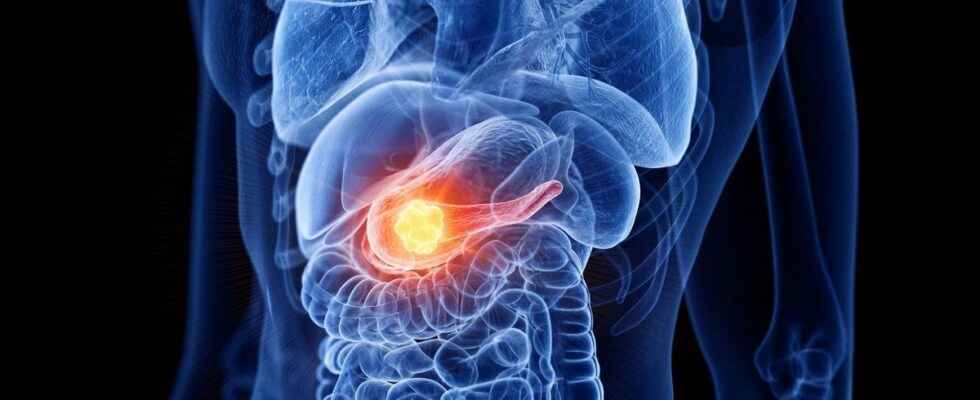Posted ,
Reading 2 mins.
Pancreatic ductal adenocarcinoma (PDAC) is a type of pancreatic cancer that is on the rise worldwide. The mortality rate of this malignant tumor is high, especially because diagnosis and treatment are often delayed. Researchers have succeeded in highlighting alterations in the composition of the faecal microbiota, associated with an increased risk of pancreatic cancer, which could ultimately allow an early diagnosis of this serious disease.
pancreatic cancer
Pancreatic cancer is rather rare, as it represents less than 2% of cancers in France. Nevertheless, in 2018, it was the 7th most common cancer in women and the 9th in men, according to the National Cancer Institute. It affects men more than women. However, more and more women are affected by this malignant tumor located in the pancreas.
This increase in the number of patients, among women and globally, would be essentially linked to the hygiene of life. Indeed, the main recognized risk factor in the occurrence of pancreatic cancer is smoking. Other risk factors have also been identified, such as overweight, obesity, diabetes or high consumption of alcoholic beverages.
Diagnosis often too late
Very often, pancreatic cancer is diagnosed late, due to non-specific symptomatology and signs that may have other origins. However, in the case of cancers, the earlier the therapeutic treatment, the higher the chances of survival.
This is why German researchers have led work at the European Molecular Biology Laboratory in Heidelberg, Baden, Germany. Their goal is to obtain evidence of the existence of traces of pancreatic adenocarcinoma (cancer cells) in the microbiome of patients.
What is a faecal microbiome analysis?
To carry out this scientific study, led by doctors Nuria Malats and Peer Bork, microbiome samples of feces were collected and then analyzed. As a reminder, the microbiome brings together a set of microorganisms, that is to say a community of bacteria that is part of the ecosystem of a particular environment.
For this work, the results of which were published in the medical journal GUT, more than 200 samples were dissected. These were from 57 adults of Spanish descent newly diagnosed with pancreatic cancer, 50 healthy individuals, 29 individuals with chronic pancreatitis, and 57 patients with early or advanced disease. .
Consult an oncologist online
Towards early detection?
Thanks to the identification of certain markers and classifiers, the scientists realized that a certain microbiota profile in the stool could lead to an early diagnosis of pancreatic cancer. The experts concluded that “Taken together, our results indicate that a non-invasive, robust and specific faecal microbiota-based screen for the early detection of PDAC [progression de l’adénocarcinome canalaire pancréatique] is doable”.
